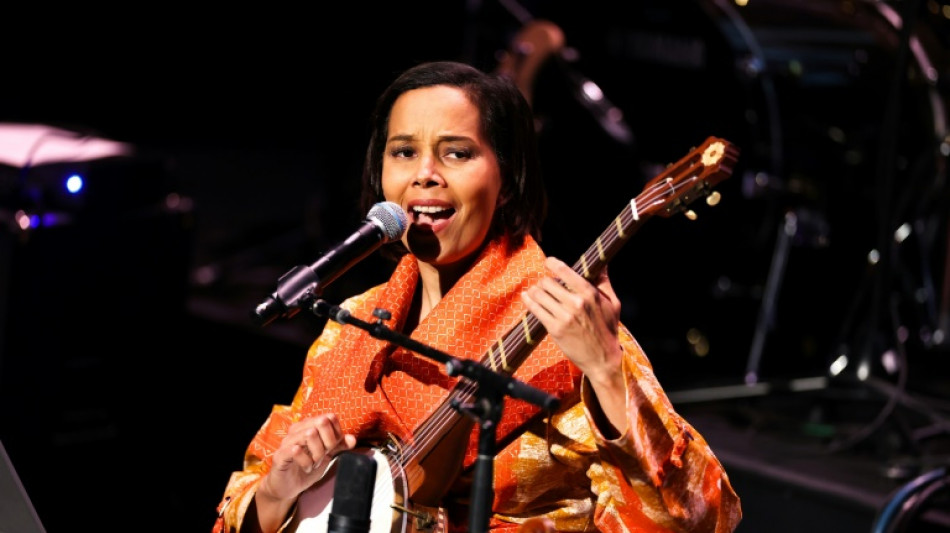

'American Railroad' musical project showcases untold immigrant stories
The Grammy- and Pulitzer-winning artist Rhiannon Giddens has long made music that sheds light on America's untold stories, and her latest project brings to the fore marginalized groups that built its railroad.
The ambitious, multi-year "American Railroad" project tells the story of the transcontinental grid's construction through the lens of workers including African American, Chinese, Japanese, Irish and Indigenous peoples whose labor, displacement and subjugation made possible the westward expansion of the United States in the 19th century.
Giddens introduced the project in 2020 as she stepped into the role of artistic director at Silkroad, the ensemble that Yo-Yo Ma conceived of in 1998.
Giddens is a scholarly minded fiddler, banjoist, vocalist and composer who has spent much of her career highlighting the weighty role of Black musicians in American bluegrass, country and folk.
This year her name cropped up in pop circles after she played the now-iconic opening banjo riff of Beyonce's hit "Texas Hold 'Em" -- but the MacArthur genius grant recipient has been a decorated music mainstay for years, wielding deep cross-genre influence.
The 47-year-old calls herself a "very American artist -- but an American artist that's very rooted in history," and her addition to Silkroad has fostered exploration of US musical traditions in the context of so-called world music.
American and British music executives have long used the vague term to categorize and market music that doesn't follow modern traditions in the West; critics say its broad definition renders it meaningless.
"It literally drives me nuts that America kind of holds itself as 'separate,'" Giddens told AFP before a recent Silkroad performance at the Brooklyn Academy of Music.
With "American Railroad," Giddens aims to show that American music has always been world music, drawing from the talents and cultural contributions of the diverse populations that comprise it.
The program includes commissioned pieces and folk arrangements like "Swannanoa Tunnel," a song written by wrongfully imprisoned Black people who were forced to build a railway tunnel across North Carolina, Giddens' home state.
The storytelling device of the transcontinental railroad lends itself to showcasing those undersung groups without whom America as we know it never would have been, she said.
"People who were not considered of worth in our society -- they were the ones who built that incredibly economically important and technologically important thing that... transformed our history," Giddens said.
- 'Points of connection' -
Along with live performance, "American Railroad" is an eponymous album and podcast series, a bid to broaden the project's reach.
And while its timing -- the album came out one week after the re-election of Donald Trump, whose presidential campaign promises included mass deportation of immigrants -- was coincidental, it's no less on the pulse.
Giddens said as the nation divided narrative swirls, it's important to keep in mind that such division is sowed "top-down."
"It's always in the best interest of the people who are utilizing the labor force to continue dividing them on the lines of class, and using race as a tool to enforce that," she said.
That's as true today as it was in America's founding, according to Giddens: "Nothing that happened during the election is anything that hasn't happened before, and is not anything that doesn't represent attitudes and opinions that have been here since the jump."
"Because when you think about the nation-state of America, it is formed on violence and division and racism and greed," she said.
With their sweeping performance the artist and her collective illuminate the darkest underbellies of American capitalism.
In doing so she hopes to emphasize the commonalities among workers, immigrants and Indigenous peoples that dogmatic westward expansion has impacted for generations -- "taking the language of music and using it to show how we can really find those points of connection."
The end of the performance includes the commissioned song "A Win For You" by Michael Abels, a piece exploring victory through cooperation, whose lyrics are mirrored by the sonic harmony of Silkroad's diverse band of instruments.
It's one effort towards good-faith hope that's aimed at societal progress, Giddens said.
"It's the never-ending dilemma of the artist... what actual good are we doing?" she said. "I don't know, but I do know that audiences have been very receptive and kind of needing this sort of message right now."
"The more we see ourselves in other peoples, even though we've been told we're very different, the more we can actually do something."
A.Meyers--LiLuX



